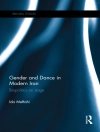During the uprisings of the Arab Spring between 2010 and 2012, oppositional movements used political humor to criticize political leaders or to expose the absurdities of the socio-political conditions. These humorous expressions in various art forms such as poetry, stand-up comedy, street art, music, caricatures, cartoons, comics and puppet shows were further distributed in the social media.
This first comprehensive study of political humor in the uprisings explores the varieties and functions of political humor as a creative tool for resistance. It analyzes humorous forms of cultural expression and their impact on socio-political developments in different countries of the Middle East and North Africa with a special focus on the changing modes of humor.
Over de auteur
Sabine Damir-Geilsdorf is Professor for Middle Eastern Studies and Director of the Institute of Middle Eastern and South East Asian Studies at the University of Cologne. She obtained her Ph D in Islamic Studies with a thesis on the Egyptian Islamist Sayyid Qutb (1906-1966) and received her postdoctoral qualification degree (Habilitation) with a study on Palestinian narratives of the Arab-Israeli war 1948. She has carried out field research in various countries of the Middle East and has published widely on transformations of religious concepts, Islamism, (forced) migration in the Middle East, Islam in Germany, and popular culture in Middle Eastern societies.
Stephan Milich is senior lecturer in Arabic Literature and Islamic Studies the University of Cologne. His research interests include contemporary Arabic poetry and prose, culture and ideology as well as representations and concepts of exile and trauma in Arabic literature. He has published widely on modern Arab poetry and translated a number of literary works by contemporary Arab authors such as Mahmoud Darwish, Mohammed Bennis, Rosa Yassin Hassan into German. He currently works on representations of trauma in contemporary Arabic fiction with a special interest in `trauma politics’ as well as on German orientalism and `orient politics’ in WWI.












